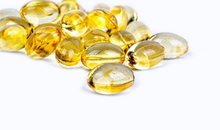
 Flash News
Flash News
Don't lose face/ After Rama's 'threat', SP candidates withdraw request from CEC
VIDEO/ The assassination in Durrës, the moment of the murder of 29-year-old Ermir Dedja
Assassination of Ermir Dedja in Durrës, the murder weapon and a burned car are found in the village of Gërdec
"Toyota Yaris" file, GJKKO sentences the former chief prosecutor of Vlora to 2.8 years in prison
Makinën plot me d*ogë, vihen në pranga dy persona në aksin “Mamurras-Kashar”
Discover the main signs that indicate your body lacks vitamin D

This is the time of year when the sky is constantly cloudy and the atmosphere is full of fog. The result? Limited time in the sun and an increased risk of vitamin D deficiency.
It is known that sun exposure is the easiest way for our body to produce vitamin D, specifically, through UVB radiation, which activates the synthesis of this hormone in the skin.
It is believed that 15 to 30 minutes in the sun each day is enough to meet the needs of the average person.
However, if you can't get enough sun exposure, whether it's winter or because you avoid the sun due to skin risks, there are other ways to keep your vitamin D levels within normal limits, through diet or supplements.
Most people need 600-800 IU of vitamin D per day, but there are cases that require higher doses: people who rarely go out in the sun, the elderly, people with dark skin, and those suffering from diseases such as liver dysfunction or absorption problems.
Why is vitamin D important?
Vitamin D plays a key role in many metabolic processes. It is essential for bone health, as it contributes to the absorption of calcium and phosphorus. At the same time, it helps the heart, thyroid and immune system function properly, while reducing inflammation and helping to control infections.
What happens when you have a vitamin D deficiency?
If measures are not taken, severe deficiency (hypovitaminosis D) can lead to diseases related to bone metabolism, such as rickets, osteoporosis, or osteomalacia.
The jaw bones also weaken, making the teeth more vulnerable to gingivitis and periodontitis.
Vitamin D deficiency has also been linked to hypertension, diabetes, fibromyalgia, and neurological conditions such as multiple sclerosis.
What are the signs of vitamin D deficiency?
Below you will find the most common symptoms that may indicate vitamin D deficiency. However, only a blood test can confirm the diagnosis:
fatigue
If you feel constantly exhausted for no apparent reason, low vitamin D levels may be to blame. Although the opposite may rarely be true, supplements should only be taken under the supervision of a doctor.
Bone and muscle pain
There is a correlation between muscle or joint pain and low vitamin D levels, mainly because proper calcium absorption is hindered.
Hair loss
Vitamin D deficiency can affect the life cycle of the hair follicle, causing thinning or even alopecia (total loss of hair and its growth on the body).
Frequent infections or colds
If you get sick often, your immune system probably needs a boost, and vitamin D is essential for its proper functioning.
Low mood, depression or anxiety.
Although the link to depression is not absolute, vitamin D deficiency can worsen symptoms such as mental fatigue, mental exhaustion, and seasonal affective disorder (SAD).
Foods and supplements that help
The sun helps the body synthesize vitamin D3 (cholecalciferol), while the diet provides vitamin D2 (ergocalciferol). The best sources are:
cod liver oil and other fish oils
fatty fish (salmon, tuna, swordfish, trout, mackerel, herring, eel)
egg yolk
whole milk and butter
porcini mushroom
In more severe cases, your doctor may recommend supplements in the form of pills or drops. But be careful, an overdose of vitamin D can have serious side effects, especially on the heart and kidneys.
Latest news



Enigma/ How did the SP grow more than in the previous elections this year?
2025-05-20 15:12:50
Threat against President Osmani, KMDLNJ: Risk to security and democracy
2025-05-20 15:01:56

Hungary's parliament approves withdrawal from the International Criminal Court
2025-05-20 14:50:00
Defamation lawsuit against Albana Vokshi, hearing postponed at the GJKKO
2025-05-20 14:36:20
Names/Who are the 140 MPs who will sit in the Assembly?
2025-05-20 14:21:57
Why don't young people want to get married anymore?
2025-05-20 14:15:27
EU approves new sanctions against Russia
2025-05-20 13:49:54
Flax seeds, positive and negative effects of their consumption
2025-05-20 13:45:54

Pope Leo XIV's house goes up for auction for $250,000
2025-05-20 13:23:49

Don't lose face/ After Rama's 'threat', SP candidates withdraw request from CEC
2025-05-20 13:02:09
Berisha warns Rama: You will not stay in power with this farce
2025-05-20 12:55:00



RTSH's official website hacked, fake news about Kosovo appears
2025-05-20 12:10:17

Accident in Korça, motorcycle collides with car, 45-year-old injured
2025-05-20 11:44:48


Germany/ 46-year-old Albanian injures three people, including an 11-year-old
2025-05-20 11:12:01
What does the agreement between Britain and the EU contain?
2025-05-20 11:01:38


Kosovo bans chicken imports from Brazil
2025-05-20 10:33:45
Makinën plot me d*ogë, vihen në pranga dy persona në aksin “Mamurras-Kashar”
2025-05-20 10:23:33
How does speaking multiple languages change the brain?
2025-05-20 10:15:05
Photo/ This is the 29-year-old who was executed in Durrës
2025-05-20 10:00:39
Foreign exchange/ How much foreign currencies are bought and sold today
2025-05-20 09:51:04




Discover the main signs that indicate your body lacks vitamin D
2025-05-20 09:06:39

Horoscope, what do the stars have in store for you today?
2025-05-20 08:50:06

He was executed by masked men, who is the 29-year-old who was killed in Durrës?
2025-05-20 08:28:21
Assassinations in Durres, 29-year-old executed
2025-05-20 08:14:59
Clear skies and light clouds, this is the weather forecast for Tuesday
2025-05-20 08:05:40
Posta e mëngjesit/ Me 2 rreshta: Çfarë pati rëndësi dje në Shqipëri
2025-05-20 07:50:55
"We broke a myth", Shabani: The Shehaj-Lapaj debate also harmed us
2025-05-19 22:59:18




Shkullaku: With the vote of the diaspora, a slaughterhouse has been created
2025-05-19 21:46:19
CEC orders recount in 2 polling centers in Elbasan and Durrës
2025-05-19 21:33:47

250 euros a night for virtual clients, online prostitution discovered
2025-05-19 21:17:10
Yrshek, 15-year-old hits and kills an elderly man
2025-05-19 21:07:05

Adoption in Albania: The system that "holds" abandoned children hostage
2025-05-19 20:52:27

Counting for preferential vote in Tirana ends, Xhaçka receives mandate
2025-05-19 20:23:22
Kosovo President Vjosa Osmani receives death threat
2025-05-19 19:47:49



Safet Gjici's release, lawyer: Today the true face of justice was seen
2025-05-19 19:02:46

King Charles writes to Biden after being diagnosed with cancer
2025-05-19 18:34:07

Ceasefire in Ukraine, Trump holds phone conversation with Putin
2025-05-19 18:24:47
56-year-old Albanian man in Italy dies at work after being hit by truck
2025-05-19 17:52:50


Migrant boat sinks off French coast, 1 dead, more than 60 rescued
2025-05-19 16:58:47
January-March, the number of births fell by 14%
2025-05-19 16:48:50

Nothing new from Edi Rama's politically subjugated justice
2025-05-19 16:33:53
Diagnosed with cancer, Biden breaks silence
2025-05-19 16:14:30

Pensions with Italy, here's what immigrants benefit from
2025-05-19 15:56:54

He fell from the church roof, the priest was brought by helicopter to Tirana
2025-05-19 15:40:16
Who spends more money, men or women? The statistics speak for themselves
2025-05-19 15:28:57
Car collides with Fier-Roskovec bus, one injured
2025-05-19 15:24:03
Since... what if...
2025-05-19 15:05:20

"Partizani" file, GJKKO passes Berisha and Malltezi on trial
2025-05-19 14:46:23
The euro exchange rate starts the week falling, near its historical minimum
2025-05-19 14:32:43
Britain agrees to restore trade and defense ties with the EU
2025-05-19 14:22:32

Liberian footballers remain stranded in Albania, football club did not pay them
2025-05-19 14:00:16
Shkodra Police Destroy Over 1,500 Narcotic Plants
2025-05-19 13:48:24
A phone call in Albania becomes a "bone of contention" between Meloni and Macron
2025-05-19 13:35:31
The drop in domestic prices reduces milk imports for January-April by 15%
2025-05-19 13:30:06
EC report: Albania's economy expected to slow down in 2025-2026
2025-05-19 13:18:06

Safet Gjici released from prison due to serious health condition
2025-05-19 12:56:05




